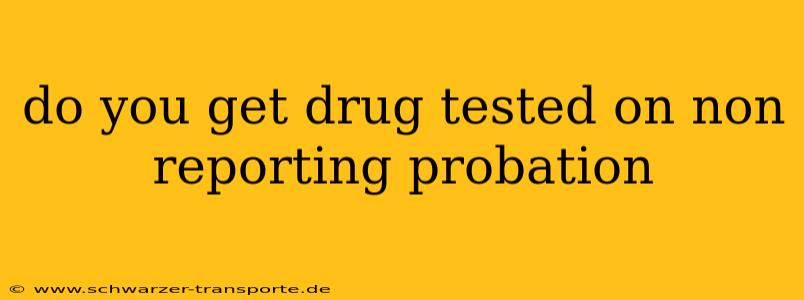Meta Description: Wondering if you'll face drug testing on non-reporting probation? This comprehensive guide clarifies the rules, explains variations across jurisdictions, and offers advice. Learn about potential drug testing scenarios, the frequency of tests, and what happens if you violate probation. Understand your rights and responsibilities during non-reporting probation.
Understanding Non-Reporting Probation
Non-reporting probation, also known as unsupervised probation, means you don't have regular check-ins with a probation officer. This doesn't automatically mean you're free from drug testing. While the level of supervision is reduced, the court still retains the power to enforce the conditions of your probation. The possibility of drug testing depends heavily on the specifics of your case and the jurisdiction.
Drug Testing on Non-Reporting Probation: The Variables
Several factors influence whether you'll be subjected to drug testing during non-reporting probation:
1. The Original Court Order:
-
Explicitly Stated Conditions: The most crucial factor is the wording of your court order. If the order explicitly mandates drug testing, regardless of the probation type, you will be tested. This could involve random testing, or testing triggered by specific events.
-
Underlying Offense: The nature of the crime for which you were placed on probation plays a significant role. Drug-related offenses almost always include mandatory drug testing, even on non-reporting probation. The court may view this as essential for rehabilitation and ensuring public safety.
2. Jurisdictional Differences:
Laws and practices vary significantly between states and even within counties. Some jurisdictions are stricter than others when it comes to drug testing, even for unsupervised probation. Research your specific area's probation guidelines.
3. Reasonable Suspicion:
Even without a direct court order mandating routine testing, your probation officer (or even law enforcement) might request a drug test if they have reasonable suspicion of drug use. This suspicion could arise from observations of your behavior, interactions with others, or tips from informants.
4. Triggering Events:
Certain events can trigger drug testing, even on non-reporting probation:
-
Arrest for any offense: A new arrest, regardless of the charge, can automatically trigger a drug test.
-
Violation of other probation conditions: If you violate any other condition of your probation (e.g., failing to maintain employment), it might lead to a drug test.
-
Positive feedback from informants: If someone provides information suggesting drug use, this could result in a drug test.
How Often Could You Be Tested?
The frequency of drug testing, if mandated, can vary. It could range from random testing (with no set schedule) to periodic testing (e.g., once a month). The court order will specify the testing frequency, if any.
What Happens if You Violate Probation?
Failure to comply with a drug test requirement, or testing positive for drugs, can result in severe consequences. This could include:
-
Revocation of probation: Your probation could be revoked, and you could face the original sentence.
-
Increased supervision: You might be transitioned from non-reporting to reporting probation, with increased monitoring.
-
Jail time: Depending on the severity of the violation and the judge's discretion, you could face jail time.
Seeking Legal Counsel
If you're on non-reporting probation and have questions about drug testing, it's essential to seek legal counsel. A lawyer can review your court documents, explain your rights, and advise you on the best course of action. Don't hesitate to ask for clarification on any aspect of your probation terms.
Conclusion
While non-reporting probation offers reduced supervision, it doesn't guarantee freedom from drug testing. The possibility and frequency of testing depend on various factors, including the court order, the nature of your offense, and jurisdictional variations. Understanding your probation terms and seeking legal advice is crucial to avoid potential violations and their serious consequences. Remember, staying drug-free is essential, regardless of the level of probation supervision.
